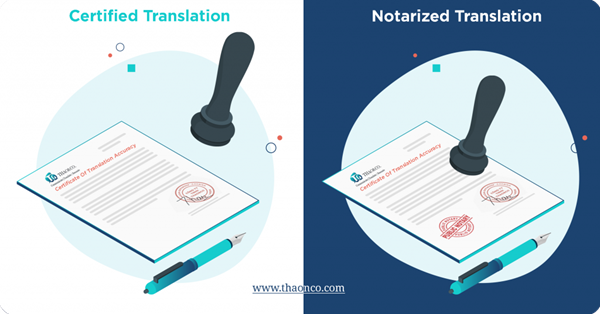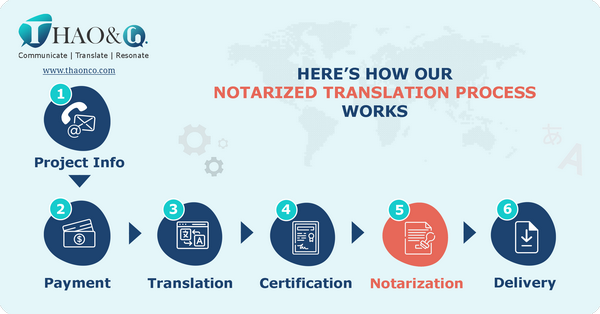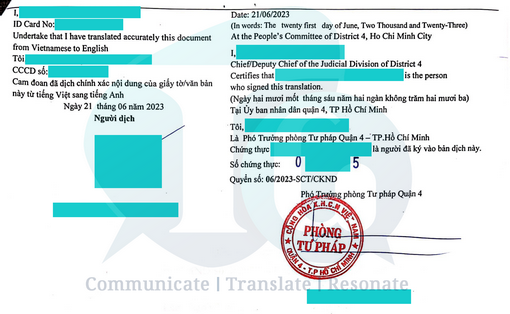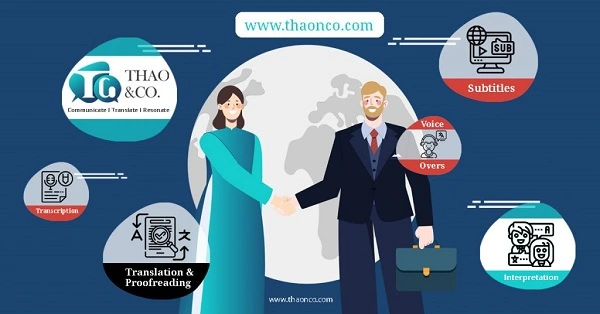You may hear about notary public translation when submitting foreign documents to a government or institution. In this article, we will explain what notarized translation or notary translation is, how it works, and answer other commonly asked questions about this topic.
At its simplest, a notarized translation or notary translation is performed by a Notary Public as an additional authentication layer to the certified translation. It’s important to know that a notary’s stamp and signature only verify the identity of the translator, not attest to the quality or accuracy of the translation.
Since notarization is not a proper indicator of translation quality, many organizations only require certified translations. However, there are still some governments or institutions that require notary public translation translations to be accepted.
Whether a translation needs to be certified or both certified and notarized depends on the requirements of the place to which you will submit your documents. In most cases, notarization is issued for certified translations of legal documents.
The main purpose of notarization is to legalize translations of documents within a country. Furthermore, a translation has to be notarized before submitting it for consular authentication (applied to non-Hague Apostille countries such as Vietnam, United Arab Emirates, Malaysia, etc.) to be able to use oversea. For foreign documents to be used in a different country, the process is reversed.
Learn more about How to differ Consular Authentication from Apostille to avoid misunderstanding between these definitions.
For individuals, a notarial translation is commonly needed for studying oversea, travelling abroad, seeking immigration, etc. And for enterprises, it usually serves the purposes of making bids, forming joint ventures, submitting documents to authorities, importing/exporting goods and services, etc.
For example, an immigrant Visa application typically requires notary public translations of the following:

For contracting firms, a bidding dossier typically requires notarial translations of the following:
You should check for the exact requirements before ordering translation and notary services to avoid any potential issues. And if you are still uncertain about the process, Thao & Co. offers you an extensive consultation from our specialists to reduce the administrative procedure burden for you or your company. Head over to our Get A Quote page to receive a free estimate!
When you book a notary public translation service, your documents will be translated and certified before continuing with the notarizing process. During the process of notarizing translated documents, the translator will work with the Notary Public to get a notarial certificate.

The translator may have to show their ID card, a certification statement, and other relevant documents to confirm their identity. After that, the Notary will sign and put the official seal on the translation.
Does notary translation require the original document? This is a common question of many people when dealing with notarization procedures. The answer is Yes. The officer will ask for the original document to compare with the copy and translation before putting on the notarial stamp.
For standard documents such as ID cards, passports, and birth/marriage certificates, notarization only takes 2-3 days, including translation and obtaining the notary stamp. However, more complicated documents such as contracts, court orders, and bidding dossiers will take more than 3 days to receive the final work.
You are probably still anxious about how the progress is going on after ordering a translation and notary service. Understanding that, Thao & Co. develops our own Dashboard to provide real-time updates of all your project information including price, payment status, and project progress. Therefore, you can keep track of everything anywhere and anytime.
Technically, you can translate your document for personal use but you can not certify or notarize it yourself. Translations must be certified by professional translation companies or translators from professional associations of translators (e.g. ATA, ELIA, STIBC, etc.), and notarized by competent authorities when it comes to legal purposes.
Here is a practical example of notarial translation:

These terminologies may be confusing when you look for translation services. The only difference between notarized translation and certified translation is the involvement of a Notary Public.
A certified translation is executed by a certified translator or a translation company. On the other hand, a notarial translation is acquired from an official notary public, who is authorized by the government.
Most translation agencies provide certification services but not all of them have or can legally offer notary public translation services, depending on their range of services and notarial regulations of the country in which they operate.
Learn more about the differences between Certified vs. Notarized Translation to request the eligible certification for your translation.
The price of a notary public translation service includes:
The notarization fee generally depends on the number of pages and which governmental office you submit your documents to, but the translation cost is more complex. As mentioned, notarization is not an assurance of translation accuracy so a thorough translation service is vital to prevent paperwork troubles in the long run.
Furthermore, Thao & Co. provides professional translation and notary services with a free certificate of translation accuracy, when required. If your documents need to be used in another country, we also offer consular authentication services for an additional fee.
A locally based agency is the best choice when it comes to translation and notary services. These translation companies have a good understanding of the government regulations and specialize in this line of work.
Don’t just focus on the notarial stamp! It would help if you also considered other factors such as the quality of the translation, customer service, and capable supporting services. A low-quality translation can lead to a series of unexpected issues.

Thao & Co. delivers high-quality translations performed by experienced native linguists to meet your every need. We also provide comprehensive notary public translation services for your better experience:
Please contact us via our Get A Quote page to receive prompt consultation!